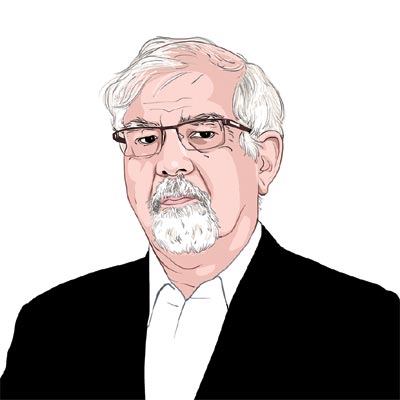Opinion Congresss tryst with UP
No matter who wins,UP election is a turning point for Indian democracy
No matter who wins,UP election is a turning point for Indian democracy
Today is a very important day in Indias political history. The Congress party has properly identified this election as an important event in the journey to anoint Rahul Gandhi as the political leader of the party and PM hopeful in 2014. The UP election has been correctly billed as the semi-final,the event before the Event.
I watched Gandhi give his election speech at Bhognipur. Analysts have noted how his delivery has improved. He appears confident,and direct. However,the content left me perplexed. For more than half of his speech,Gandhi made the following controversial,surprising,and somewhat incorrect points. First,that the present people ruling UP state that India is Shining. We know that is not the case,and not the case especially in UP. Gandhi continues: You guys dont have a shirt on your back,you go hungry at night,and there are no jobs. You have to migrate out of state to look for jobs. Situation is terrible,Gandhi swears. And why,he rhetorically asks. Because,he answers,the poor people have not had a Congress government for 22 years. Hence,to better themselves,it is in the voters interest to grovel back to the Congress. This last punchline was echoed in speeches by Sonia Gandhi and Priyanka Gandhi.
My problems with the speech dont know where to begin. First,the India Shining slogan is eight years old,and was an electoral taunt at the BJP in 2004. In 2012,just like the Congress,the BJP is not an important player in UP. It is fighting to not come last in the four-cornered race. So who is the India Shining and the desperate poverty appeal aimed at? To the Dalits and the poor who have finally,after 43 years of Congress misrule between 1947 and 1990,seen a major improvement in their lives? And why,tell me why,should the voter bring back the Congress? For less corruption? For better development? And what is the evidence that the Congress delivers? In streetside conversations,the voters in UP stated that if Bihar can have development,so can UP and Bihar,Rahul Gandhis speech-writers please note,is not only not ruled by the Congress but it is also the state in which the Congress reached the abysmally low level of 4 seats in the last assembly election in 2010.
Also,in order to win the caste vote,the Congress brought out Sam Pitroda and embarrassingly and shamelessly displayed him as their OBC representative. Look,we have a major Congressite who is an OBC. For the Muslims,the Congress was even more retrogressive they promised them an extension of a very bad idea,reservations. Not much-needed affirmative action,but discredited quotas in jobs and education. Can somebody pump 2012 reality into the Congress,rather than the me-poor-and-caste-and-poverty-stricken-country of the 1960s?
The speeches by the leaders of the BSP and the Samajwadi party could not have been more different. Under Mayawati,UP has grown at an above 7 per cent average for the last five years,the highest five-year average rate the state has experienced in its history. Even then,Mayawati was apologetic,and stressed that development had not been enough. Akhilesh Yadav stressed the positives that come about with growth,and emphasised that his party could do better. And apologised for the goondagiri that so obviously prevailed the last time his party was in power. I did not have occasion to watch any BJP leader speak presumably they stressed how rath yatras by their supreme leader bring about development by increasing sales of cold water.
The Congress obtained 22 seats in the 2007 assembly election and 100 equivalent seats in the 2009 Lok Sabha election. Exit polls suggest that the Congress would be lucky to cross the 50 mark,and that the SP,led by another youth leader,Akhilesh Yadav,was likely to obtain 160-plus seats and form the next government in UP. If the exit polls turn out to be broadly correct,then the UP election might mark the beginning of the end of the Nehru-Gandhi dynasty in Indian politics. While the debacle in Bihar could be written off as a necessary aberration in a rebuilding exercise,the defeat in UP would not be that easy to explain. To be sure,50 seats are more than double the 22-seat tally,but are also half that of the 100 seats won in 2009. Indeed,in their bravado,the Congress leadership has consistently maintained that they would get a minimum of 100 seats. And remember,UP was the semi-final; how,after losing it by obtaining only 50-odd seats,can you enter the final?
Two youthful leaders,both belonging to political families,fighting for their political futures. In one corner,Akhilesh Yadav,sounding modern,and guaranteeing free computers to the young generation. In another corner,Rahul Gandhi,heir to a 127-year-old heritage,baldly stating that the UP electorate,was poor,starving,shirtless,uneducated and without jobs. Further,Yadav seemed to enjoy politics; in contrast,Gandhi appeared to be a reluctant leader,his heart really not in being a politician. Objectively,who do you think best represents hope and development? The choice is clear,and it will be difficult to counter the impression that the Congress does not have a Gandhi leader capable of rallying India and winning elections.
It is possible that the exit polls are wrong and that the Congress obtains 75-plus seats on its own. In this instance,employing the same logic as above,Gandhi will begin to have credibility as a political leader. And he can look forward to making a fight for it in the 2014 general election. After the Bihar defeat,UP will be seen as a major triumph. In the youth battle,Rahul would have sneaked ahead.
No matter what the result,the UP election is a watershed,and a turning point in Indias democracy.
The writer is chairman of Oxus Investments,an emerging market advisory firm
express@expressindia.com





